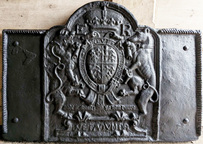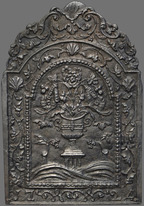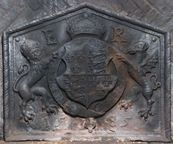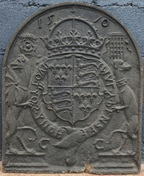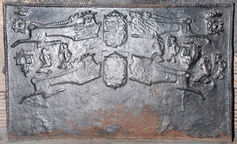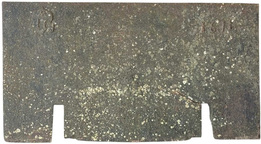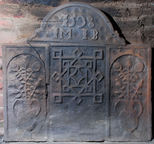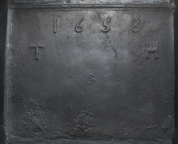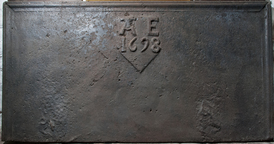-
1288
Description: Arched rectangular shape with rounded corners; ovolo within fillet moulding all round; oval Tudor royal shield with garter surrounding, topped with a royal crown; dragon and greyhound supporters; initials split by crown; inscription on a fillet between legs of supporters, behind garter finial; motto on an Ionic plinth at bottom; two rectangular side panels with twisted rope edging top and side.
Notes: The supporters are those of Henry VII or Henry VIII, but the initials suggest the fireback dates from the reign of Edward VI (1547-53). John Harvo (d. c1565) was a gunfounder who has been identified as occupying Pounsley furnace, Framfield, Sussex, possibly from as early as 1547; the fireback may have been cast originally during the reign of Henry VIII (1509-47), with the initials added to an early casting using the original pattern. The detail on the armorial back is good, showing little wear, so the casting was probably made not long after the original armorial fireback. The rivets are modern.
Inscription: E R / HONY SOIT QVE MAL Y PAYNCE / Made in Sussex by John Harvo / DV ET MOVN DROI
Arms: Tudor royal - Probably Henry VIII
- Decoration tags:
- rectangular with round arch (shape)
- rope (edging)
- simple stamps
- whole carved pattern
- heraldic
- armorial
Manufactured: in the mid- to late-16th century in the Weald area of England.
Current location: not known.
- Attached to series:
- John Harvo series
- Pounsley series
-
1032
Description: Arched rectangular shaped central panel with solid and hollow bead on fillet edging, grouped alternately in threes and twos respectively, on a wide fillet; on a Tuscan pedestal rising from waves, a narrow waisted, gadrooned flower vase with two scrolled handles and a horizontal banded decoration from which issue tendrils bearing flowers, berries and seed pods; arched rectangular shaped border with fillet edging, wide at the sides, symmetrical floral fronds descending from a scallop shell, top centre, with a scallop shell inside each shoulder; at base, date split between two looped 'W' figures; on top, symmetrical scrolled plant tendrils descending from a central scallop shell.
Notes: The third largest of six flower vase firebacks designed and made in the same year, larger ones of which include a religious inscription in Welsh. All incorporate the looped 'W' motif which may be intended to identify the pattern maker. Cheffins auction, Cambridge, 13 Jun 2018, lot 738 (£240).
Copies of this fireback are known.
Inscription: 17 24
Manufactured: in 1724 in England.
Current location: not known.
- Attached to series:
- 1724 series
- British 'Dutch' style firebacks
-
40
Description: Pentagonal; convex, twisted cloth edging with inner fillet; Tudor royal shield, garter, crown and supporters (crowned lion and dragon); initials split by crown; date split by garter buckle.
Notes: Royal arms of Queen Elizabeth I; uncommon edging.
Inscription: E R / HONY SOIT QVI MAL Y PENSE / 1585
Arms: Tudor royal (Elizabeth I)
- Decoration tags:
- triangular arched (shape)
- convex, twisted cloth with inner fillet (edging)
- whole carved pattern
- individual numbers
- armorial
- royal
- text
Manufactured: in 1585 in the Weald area of England.
Current location: in private hands, Cuckfield, West Sussex, England.
- Attached to series:
- Elizabethan royal armorial firebacks
- Tudor royal armorial firebacks
-
1261
Description: Arch-shaped; fillet edge; at top, date split by crown (horizontal of '7' missing), crown over a Tudor shield, garter (motto clockwise but reversed) and supporters; rose with viscount's coronet on dexter, and portcullis (grid of 16) with viscount's coronet on sinister side of crown; the supporters, a dragon and a greyhound, stand on separate plinths; the initials, G C, are placed in either side of the garter buckle.
Notes: There are several firebacks with the Tudor royal arms that were probably originally produced in the Spanish Netherlands, perhaps illustrating the association between England and Spain through the marriage of Henry VIII and Katherine of Aragon. The firebacks differ in several small details, such as the shape of the shield, the form and rotation of the Garter motto, the style of the crown, the positioning of the supporters in relation to the Garter, and the form and size of the crowned rose and portcullis. Hôtel Drouot auction, Paris, 21 Jan 2023, lot 89.
Inscription: 15 70 / HONY SOYT QVI MAL Y PENSE / G C
Arms: Tudor royal
- Decoration tags:
- rounded arched (shape)
- fillet (edging)
- carved stamps
- whole carved pattern
- heraldic
- armorial
- royal
- text
- animals
Manufactured: in 1570 possibly in the Wallonia area of Luxemburg.
Current location: not known.
- Attached to series:
- Tudor royal armorial firebacks
- Continental Tudor royal armorial firebacks
-
322
Description: Rectangular; rope edging (top and sides); two central crowned Tudor shields, one above the other, each with lion passant guardant sinister to the left, and lion passant to right; crowned, barbed, four-petalled rose in right and left corners; two crowned shields with KH in Lombardic characters above a fleur de lys, each irregularly placed between lions on left and right sides; three 'imps' with right arm raised, two on right and one on left between lions; two ‘imps’ with both arms lowered, one on each side in similar positions.
Notes: One of the legs of the leopards on the right is missing, suggesting that the stamp, which appears complete on many firebacks, was well used and had been damaged; this suggests a relatively late use of these stamps. The same heraldic charges can be seen on other firebacks, with other charges, forming the decoration on many other firebacks, suggesting they were the stock of one particular furnace.
Arms: Tudor royal arms of England
- Decoration tags:
- rectangular (shape)
- rope (edging)
- carved stamps
- heraldic
- armorial
- royal
- animals
Manufactured: in the mid- to late-16th century in the Weald area of England.
Current location: Hever Castle, Hever, Kent, England.
- Attached to series:
- Royal series
-
1309
Description: Rectangular shape; no edging; top left, inverted 'renaissance' shield with the initials M above IE; top right, date 1671 in unseriffed numerals.
Notes: The shield with initials has not been noted on another fireback. The slots in the fireback are to accommodate andirons or firedogs.
Inscription: IME [triad] 1671
- Decoration tags:
- rectangular (shape)
- none (edging)
- carved stamps
- individual numbers
- text
Manufactured: in 1671 in England.
Current location: Lay's Auctioneers, Alverton Road, Penzance, Cornwall, England.
- Attached to series:
- Date & initials firebacks
- Andiron slot firebacks
-
474
Description: Fragment; arched rectangular shape with rounded corners; ovolo within fillet moulding all round; oval Tudor royal shield with garter surrounding, topped with a royal crown; dragon and greyhound supporters; initials split by crown; inscription on a fillet between legs of supporters, behind garter finial; motto on an Ionic plinth at bottom; left hand rectangular extension panel with twisted rope edging on top and side: initials in top left corner, ‘dragon’s head’ in top right corner, rose-en-soleil stamp in centre, rose stamp bottom centre.
Notes: The letters on the extension panel are the same form and size as those on the top of the armorial pattern, indicating that they were added to the armorial, perhaps to indicate a change of reign. The letter 'E' has also been noted on another fireback of the same series. The rose-en-soleil was the badge of King Edward IV and, thus, a Yorkist symbol; it is seen on other firebacks. From a house in Chailey, Sussex. Illustration from Lower (1849).
Inscription: E R / E / R / HONY SOIT QUE MAL Y PAYNCE / Made in Sussex by John Harvo / DV ET MOVN DR...
Arms: Tudor royal
- Decoration tags:
- rectangular with round arch (shape)
- complex individual (edging)
- carved stamps
- whole carved pattern
- individual letters
- armorial
- royal
- text
- animals
- plants
Manufactured: in the mid- to late-16th century in the Weald area of England.
Current location: not known.
- Attached to series:
- Pounsley series
- John Harvo series
- Rose-en-soleil series
-
475
Description: Composite of three elements; central panel has a complex ‘knot’ pattern with a fillet edge; side panel, repeated on either side of the central panel, contains a vase of flowers, possibly stylised thistles, within an arched frame and fillet edge; arched panel above, also with fillet edge, contains the date and inscription; the spandrels of the side panels, and the arched top panel, contain a series of 'bullseye' motifs comprising concentric rings deepening towards the centre.
Notes: One of an unusual series formed from separate panels arranged, in this instance, with the outer panel repeated.‘Knot’ patterns were popular in gardens of the period. The garden theme is continued with the side panels. A version of the same design, recorded in a photograph of 1904 at Willesden, London, is a different casting, the top panel with the date and initials, being straight not slightly askew as in this example.
Inscription: 1598 / IM IB
- Decoration tags:
- rectangular with round arch (shape)
- astragal (edging)
- carved pattern panels
- text
- plants
- objects
Manufactured: in 1598 in the Weald area of England.
Current location: in private hands, Linchmere, West Sussex, England.
- Attached to series:
- Armada series
- Garden design types
-
1072
Description: Rectangular shape; ovolo-moulded edging (top and sides); date top centre; initials split below date.
Notes: The initials are believed to relate to Thomas Hughes (1604-64), MP and Governor of Chepstow Castle, who lived at Moynes Court, Mathern; a slightly larger variant of the same date but without initials has been noted; the right edge is concealed behind stonework.
Inscription: 1658 / T H
- Decoration tags:
- rectangular (shape)
- ovolo (edging)
- carved stamps
- individual letters
- individual numbers
- text
Manufactured: in 1658 possibly at Tintern Furnace in the Forest of Dean area of Wales.
Current location: in private hands, Mathern, Monmouthshire, Wales.
- Attached to series:
- 1640-50s Dean series
-
1096
Description: Rectangular shape; ogee/cyma reversa moulded edging (top and sides); top centre, shield-shaped stamp bearing initials above date.
Notes: Two blemishes on the surface of the casting indicate that the molten iron was probably poured from two ladles simultaneously disturbing the casting sand in both locations.
Inscription: AE / 1698
- Decoration tags:
- rectangular (shape)
- cyma reversa/ogee (edging)
- carved stamps
- date stamp
- heraldic
- text
Manufactured: in 1698 in the Weald area of England.
Current location: The Manor House, Mark Cross Lane, Ripe, East Sussex, England.
- Attached to series:
- Date & initials firebacks
